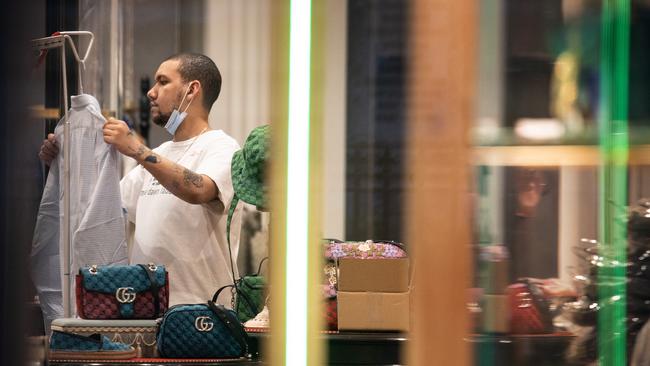Lockdowns, right or wrong, must be learned from


Last year sustained criticism of the Andrews government for the lapses in hotel quarantine was perfectly justified, but that did not affect the necessity of last year’s long lockdown in Victoria.
As much as people didn’t like it, nor the government that has presided over it, the rates of infection in Melbourne, obtained from epidemiologist Mary-Louise McLaws, which I published in a column last year, proved the lockdown response to be the correct one.
The Victorian government’s health advice was proved right despite the blatant ideological criticisms of the lockdown as a “dictatorial response” or an “economic disaster”. What is puzzling is that the virulent critics didn’t see 800 deaths as a foreboding of what might have occurred if Melbourne had opened too soon.
Now in this second lockdown, caused by another even more virulent strain of this virus, yet again the politicised commentariat are back on what is really a covert ideological attack.
However, this time the anti-lockdown commentary has taken another tack. It is replete with warnings of the dire consequences to our mental health, and especially of the damage to the young. Scott Morrison has alluded to this in his criticism of the Victorian response, and many others have jumped onto this bandwagon.
It is a valid concern. That is why it is such a valuable emotional argument. It pits the absolutely valid concerns of parents and psychologists against the monolithic state government, whose health bureaucracy seems to be floundering.
However, whether it is a valid reason not to call lockdowns in circumstances such as Victoria’s current battle against a 60 per cent more virulent strain of Covid that might end up being resistant to vaccines, is another matter.
It should be remembered that, according to polls, the Victorian public did not see last year’s lockdown as an “attack on freedom”. Most people were simply glad they got out of it alive and well.
Neither did it cause national economic catastrophe. It did exacerbate Victoria’s 10-year economic decline, caused mainly by a steady downward trend in population, according to a recent report by Saul Eslake. That would, of course, have been a lot worse if more people had died.
Recurrent lockdowns can hurt mental health, but how much it has exacerbated an already pressing problem is not clear. Our country already has high rates of stress and anxiety among its youth and why this is the case, even outside a pandemic, should be the pressing concern.
It is all very well to harp on the possible effects of lockdowns in the pandemic, but it is more pertinent to ask why, in one of the richest, most fortunate countries in the world where children should be happy and optimistic, they are not. High levels of psychological distress among youth cannot be solely blamed on the pandemic and subsequent lockdowns. Looking at the broader picture over time seems to confirm this.
By the beginning of this century young people appeared to be suffering mental health problems at an earlier age than before, experiencing them at higher rates than older age groups, and retaining their increased risk beyond youth into older age.
In a 2007 survey by the Australian Institute of Health and Welfare among Australians aged 15-24, mental disorders were 49 per cent of the burden of disease, measured as both death and disability. By 2020, one third of Australian young people (34 per cent) reported high or very high levels of psychological distress. This is comparable to the rate in 2018.
However, on the other side of the mental health picture, three in five Australian young people (56 per cent) said they felt they were coping or dealing with life well in 2020, the same as the rate in 2018.
In short, although the pandemic and frequent lockdowns have more than likely exacerbated mental health problems of the young already at risk, we cannot blame the entire picture of worsening youth mental health on the current crisis.
The Prime Minister is right. Resilience is important because we have to learn to live with this pandemic. This pandemic will not disappear anytime soon. Vaccines alone will not defeat a virus that has an uncanny ability to mutate.
However, this generation of young people are facing a test of resilience for which they have been ill prepared, because their parents and grandparents are probably some of the least prepared to demonstrate the resilience needed.
Consequently, there is a lot of unnecessary gloom and doom about children’s education and their mental health, but not much is said about the value of a resilient upbringing and parental responsibility, even as first educators of children.
The light at the end of this tunnel might not be the end of the virus, but rather the realisation that we are now in a new normal. If we face this fact and adjust by reassessing our priorities, that will help us to cope.
One young husband told me that the pandemic and lockdowns, while difficult, have made him and his wife “reassess their priorities” as a family. That family have grasped that the world has changed, that living in a great city, with a giant mortgage, is not the glittering prize they thought it would be. That is the beginning of resilience and they will carry that into the next generation.



As Victoria emerges from another lockdown, there has been an interesting and definite shift in the focus of commentary critical of lockdowns.